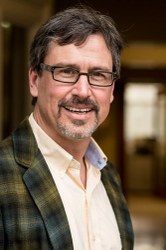Essay by Jonathan Brockopp (Penn State Univ.), Centre Daily Times, August 04, 2019
We have it pretty good in Centre County. Plentiful jobs, great arts and music, world-class sports — there’s a lot to like. We are even pretty well-protected against the ravages of climate change. Sure, heat waves are becoming more common, but rising sea levels won’t touch us. Even hurricanes, when they get this far inland, lose most of their punch.
So, it’s pretty hard to get too worried about climate change; it just doesn’t seem to have much to do with us. But our isolation is an illusion.
In fact, climate change and Centre County are deeply connected, and not in the ways you might think. Last month, I focused on local effects happening right now to ticks, trout and trees, but that’s just the beginning.
Those crazy climate stories we read about in this newspaper: devastating hurricanes in Mozambique, Puerto Rico and North Carolina; rising seas in Jakarta and Miami; deadly heat in Europe? We helped cause them, and we can help them from getting worse. To understand this, we need to go back in time.
When I first moved to Centre County, I was immediately curious about the strange stone pyramid on College Avenue near the historical society. This, I discovered, is part of Pennsylvania’s iron-making history. Local trees were turned into charcoal; iron ore and limestone were mined from the nearby hills, and then all this was put into these huge stone furnaces.
It was hard and dangerous work, but Pennsylvania provided a lot of the iron – and later steel – to build our growing nation. And the power to run these furnaces came from our ancient forests, from “Penn’s Woods,” the literal meaning of Pennsylvania.
Now, wood is a renewable resource. Unlike coal and oil, if you burn down one forest you can always plant another. But in the 19th century we were cutting down our forests so quickly that professor Joseph Rothrock, our first forest commissioner, famously called “Penn’s Woods” the Pennsylvania Desert.
Pennsylvania is also home to the first oil well, to coal mining and now Marcellus Shale drilling. With all these resources, we produce more electricity than we can use. We have a huge carbon footprint, larger than any state in the Union except for Texas, California and Florida. In fact, only 26 countries have a larger carbon footprint than we do.
This history is important, because climate change isn’t something recent, it’s been going on for centuries.
Now, you may hear that carbon dioxide is plant food, and that’s true. Trees, flowers, and ocean kelp absorb lots of the stuff, but like our forests, we are producing much more carbon dioxide than these plants can use. And when we burn fossil fuels, we are putting tons of ancient carbon dioxide back into the atmosphere. Once it’s there, it stays for a very long time.
There’s no question that we have benefited from this fossil fuel economy, and much of our wealth is built on it. But as the carbon dioxide we produce enters the air, it mixes in across the globe, adding to our atmospheric blanket and trapping heat.
A fundamental ethical issue with climate change is that those who contribute the least to the problem are the ones who will suffer the most. In our case it’s the reverse: we suffer the least, but benefit the most from burning fossil fuels. In a sense, we cause others to suffer the worst effects of our actions.
By definition, ethics should take us beyond our own narrow self-interests to the needs and wants of others. We are not alone in this world, and concern for other people, for animals, even for trees, makes us ethical.
In the case of climate change, it’s time we recognize our part in causing the problem. That means not only reducing our carbon footprint, but also helping others in areas like Puerto Rico, Mozambique and North Carolina to rebuild. Many folks in Centre County are busy doing just that, and the best way to respond is to reach out and join them. It’s the ethical thing to do.
>>> NOTE: Jonathan Brockopp teaches the ethics of climate change at PSU.
##########################
SEE THIS VIDEO — An introduction to the causes of modern-day climate change, signs that the climate is already changing, and how climate change affects the environment and human well-being. By U.S. Environmental Protection Agency.

